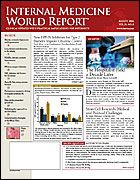Publication
Article
Internal Medicine World Report
New AHA/ASA Stroke Prevention Guidelines Stress Risk Factor Modification
Author(s):
Statins should be used to decrease the risk of ischemic stroke in patients with normal low-density lipoprotein cholesterol levels and known coronary artery disease, as well as in high-risk hypertensive patients, according to new evidence-based guidelines issued by the American Heart Association (AHA) and the American Stroke Association (ASA).
The new “primary prevention” guidelines focus on the identification and modification of risk factors for ischemic stroke (Table 1).
Stroke is the third leading cause of death and a major source of morbidity in the United States, the report states.?Every year, about 700,000 Americans suffer a stroke, resulting in nearly 158,000 deaths.?
Stroke mortality rates decreased by 18.5% between 1993 and 2003, but the number of stroke deaths decreased by only 0.7%. Direct and indirect costs of stroke in 2006 are estimated at $57.9 billion.
“It is important to identify patients at high risk of stroke, because research shows that many strokes can be prevented if those individuals modify their risk factors,” said Larry B. Goldstein, MD, the guidelines’ lead author and chair of the AHA’s Stroke Council.
Risk factors and markers for a first stroke are classified according to their potential for modification and the strength of the scientific evidence (Table 2).
All patients should be assessed for stroke risk, using a risk assessment tool, such as the Framingham Stroke Profile.
Nonmodifiable risk factors help identify those who are at highest risk for stroke and who may benefit from intensive preventive interventions, including treatment of modifiable risk factors.
Genetic risk factors, although potentially modifiable, are categorized as “nonmodifiable,” because specific gene therapies are not yet available.
New evidence shows that low birth weight is a potential nonmodifiable risk factor for stroke; adults whose birth weight was ≤2500 g are at more than twice the risk for stroke as those with a birth weight ≥4000 g. This finding underscores the importance of risk factor intervention in adults who had low weight at birth as well as of the long-term benefits of maternal health and nutrition programs.
Modifiable risk factors are categorized as “well documented” or “less well documented or potentially modifiable.” Well-known preventive interventions, such as blood pressure control, smoking cessation, moderation of alcohol use, glycemic control in patients with diabetes, regular physical activity, and a well-balanced diet are reiterated.
Plasma lipids and lipoproteins influence the risk for stroke, but the exact relationships remain unclear. The report endorses the recommendations of the National Cholesterol Education Program (NCEP) III for the management of patients with elevated total cholesterol or elevated non–high-density lipoprotein cholesterol in the presence of hypertriglyceridemia.
Adults with sickle-cell anemia should be assessed for known stroke risk factors, although the frequency of screening needed to detect most patients at risk has not been determined.
The “less well-documented or potentially modifiable” risk factors are those with less definitive epidemiologic evidence or those that lack randomized clinical trial data documenting stroke risk reduction.?The metabolic syndrome is such a risk, and individual components should be managed with lifestyle modifications and pharmacotherapy, as outlined by the NCEP III.
Obstructive sleep apnea (OSA) is a new risk factor for ischemic stroke. Recent epidemiologic evidence has associated habitual snoring and excessive daytime sleepiness (likely because of OSA) with an increased risk of stroke. Bed partners and patients, particularly those with abdominal obesity and hypertension, should be questioned about symptoms of sleep-disordered breathing and referred to a sleep specialist if indicated.
“We know that treating sleep apnea is associated with a reduction of blood pressure,” Dr Goldstein said.
Use low-dose aspirin for the prevention of a first stroke in women who are at a high enough risk that the benefits of long-term aspirin use would outweigh the risks.?Aspirin is not recommended for the prevention of a first stroke in men but should be used for cardiovascular prophylaxis, again, when benefits outweigh risks.






